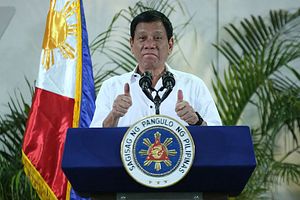Over the weekend, a leading Philippine law enforcement official spoke out about the limits of the so-called drug war led by President Rodrigo Duterte since coming to office. His comments were just the latest in a series of developments that have increased the scrutiny on the campaign as well as the extent of policy continuity and change underway in the Duterte administration.
As I have observed before in these pages, one of the signature policy initiatives of Duterte since taking office has been his so-called “war on drugs,” which has involved a heavy-handed campaign focused on killing and apprehending violators. While some polling continues to indicate that the anti-drug campaign is popular among Filipinos amid wider law and order issues left unaddressed previously, there have been concerns about some ways in which it is being carried out. The Philippine government says that over 5,000 people have been killed in anti-drug operations since Duterte came to office, but rights groups claim that the toll is likely a lot higher.
While the policy had stoked controversy since its outset, scrutiny on it has been growing in recent months, with Vice President Leni Robredo noting its failure in her brief few weeks as a so-called “drug czar,” and Duterte himself in fact admitting that it had fallen short in some aspects due to various factors including lack of enforcement and corruption.
Over the weekend, scrutiny on Duterte’s war on drugs was in the spotlight again with comments by a senior Philippine police official. Colonel Romeo Caramat, the head of drug enforcement for the Philippine National Police (PNP), said in an interview that the initial approach by the Duterte administration in the war on drugs had been ineffective.
“Shock and awe definitely did not work,” Caramat said in an exclusive interview with Reuters, in a clear acknowledgement that the violent approach to curbing illicit drugs had not been effective. Caramat added that while the volume of crime may have decreased, it had not helped stem the root of the problem because users could still buy illegal drugs “any time, anywhere in the Philippines.” He also added that he now favored a new strategy focused less on quickly arresting or killing low-level pushers and couriers and more on tactics such as surveillance that may help eventually weed out “big drug bosses.”
Caramat’s comments themselves are not surprising given the previous scrutiny we have seen from certain government officials as well as rights groups. But given Caramat’s background and his role in the drug war, his judgment has understandably drawn headlines with respect to the setbacks of one of Duterte’s signature policy initiatives since he took office back in 2016.
But beyond Caramat’s comments, it is unclear if this will actually lead to a substantial change in the policy approach adopted under the Duterte administration thus far. The chief criticism of Duterte’s approach has been the increased focus on suppression, including through the use of extrajudicial killings, relative to other aspects such as improving preventive measures, rehabilitation, and public health options, where much work remains to be done. And while officials like Caramat have recognized the limits of certain suppressive methods and indications of increasing government attention to some of these other areas, there are few signs that the imbalance in government policy is going to be addressed entirely. Whether or not this will change in the coming months and years remains to be seen.
































